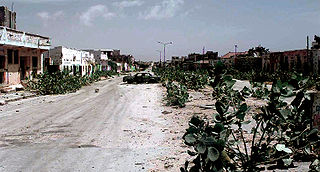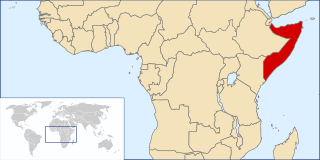
The Somali Civil War is an ongoing civil war that is taking place in Somalia. It grew out of resistance to the military junta which was led by Siad Barre during the 1980s. From 1988 to 1990, the Somali Armed Forces began engaging in combat against various armed rebel groups, including the Somali Salvation Democratic Front in the northeast, the Somali National Movement in the Somaliland War of Independence in the northwest, and the United Somali Congress in the south. The clan-based armed opposition groups overthrew the Barre government in 1991.

United Nations Security Council Resolution 1907, adopted on December 23, 2009, imposed an arms embargo on Eritrea, travel bans on its leaders, and froze the assets of some of the country's political and military officials after accusing the Eritrean government of aiding Al-Shabaab in Somalia and reportedly refusing to withdraw troops from its disputed border with Djibouti, following a conflict in 2008. The African Union and other organisations had been calling on the Security Council to sanction Eritrea for several months.

United Nations Security Council Resolution 1916, adopted unanimously on March 19, 2010, after recalling resolutions 733 (1992), 1519 (2003), 1558 (2004), 1587 (2004), 1630 (2005), 1676 (2006), 1724 (2006), 1744 (2007), 1766 (2007), 1772 (2007), 1801 (2008), 1811 (2008), 1844 (2008), 1853 (2008), 1862 (2009), 1894 (2009) and 1907 (2009), the Council extended the term of the Monitoring Group for 12 months and expanded its mandate to include the monitoring of the arms embargo on Eritrea in addition to Somalia.

United Nations Security Council resolution 1425, adopted unanimously on 22 July 2002, after recalling resolutions on the situation in Somalia, particularly resolutions 733 (1992) and 1407 (2002), the council established a panel of experts to investigate violations of the arms embargo against the country.
United Nations Security Council resolution 1519 was adopted unanimously on 16 December 2003. After recalling resolutions on the situation in Somalia, particularly resolutions 733 (1992), 1356 (2001), 1407 (2002), 1425 (2002) and 1474 (2003), the council requested the establishment of a monitoring group to investigate violations of the arms embargo against the country.

United Nations Security Council Resolution 1946, adopted unanimously on October 15, 2010, after recalling previous resolutions on the situation in Côte d'Ivoire, including resolutions 1880 (2009), 1893 (2009), 1911 (2010) and 1933 (2010), the Council extended sanctions against the country, including an arms embargo and ban on the trading of diamonds, for a further six months.

United Nations Security Council resolution 1558, adopted unanimously on 17 August 2004, after recalling previous resolutions on the situation in Somalia, particularly resolutions 733 (1992) and 1519 (2003), the Council re-established a group to monitor the arms embargo against the country for a further six months.

United Nations Security Council resolution 1587, adopted unanimously on 15 March 2005, after recalling previous resolutions on the situation in Somalia, particularly resolutions 733 (1992), 1519 (2003) and 1558 (2004), the council re-established a group to monitor the arms embargo against the country for a further six months.

United Nations Security Council Resolution 1964, adopted unanimously on December 22, 2010, after recalling previous resolutions on the situation in Somalia, the Council authorised the continuation of the mandate of the African Union Mission to Somalia (AMISOM) until September 30, 2011, and increased its size from 8,000 to 12,000 personnel.

United Nations Security Council resolution 1596, adopted unanimously on 18 April 2005, after recalling all previous resolutions on the situation in the Democratic Republic of the Congo, including resolutions 1493 (2003), 1533 (2004), 1552 (2004), 1565 (2004) and 1592 (2005), the council expanded the arms embargo to include all recipients of weapons in the country, and imposed a travel ban and asset freeze on those violating the embargo.

United Nations Security Council Resolution 1972 was adopted unanimously on 17 March 2011. After recalling previous resolutions on the situation in Somalia, particularly resolutions 733 (1992), 1844 (2008) and 1916 (2010), the Council authorised an ease on its assets freeze relating to humanitarian operations in the country for 16 months.

United Nations Security Council resolution 1630, adopted unanimously on 14 October 2005, after recalling previous resolutions on the situation in Somalia, particularly resolutions 733 (1992), 1519 (2003), 1558 (2004) and 1587 (2005), the council re-established a group to monitor the arms embargo against the country for a further six months and condemned the increase in flow of weapons to the country in violation of the embargo.

United Nations Security Council Resolution 1980, adopted unanimously on April 28, 2011, after recalling previous resolutions on the situation in Côte d'Ivoire, including resolutions 1880 (2009), 1893 (2009), 1911 (2010), 1933 (2010), 1946 (2010), 1962 (2010) and 1975 (2011), the Council extended an arms embargo, ban on the trade of diamonds and targeted financial and travel sanctions on Ivorian officials until April 30, 2012.

United Nations Security Council Resolution 1676, adopted unanimously on May 10, 2006, after recalling previous resolutions on the situation in Somalia, particularly resolutions 733 (1992), 1519 (2003), 1558 (2004), 1587 (2005) and 1630 (2006), the Council re-established a group to monitor the arms embargo against the country for a further six months.

United Nations Security Council Resolution 1724, adopted unanimously on November 29, 2006, after recalling previous resolutions on the situation in Somalia, particularly resolutions 733 (1992), 1519 (2003), 1558 (2004), 1587 (2005), 1630 (2006) and 1676 (2006), the Council re-established a group to monitor the arms embargo against the country for a further six months and condemned an increase in the flow of weapons to the country.

United Nations Security Council Resolution 1727, adopted unanimously on December 15, 2006, after recalling previous resolutions on the situation in Côte d'Ivoire, the Council renewed an arms and diamond embargo on the country until October 31, 2007.
United Nations Security Council Resolution 1766 was unanimously adopted on 23 July 2007.
United Nations Security Council Resolution 1853 was unanimously adopted on 19 December 2008.
United Nations Security Council Resolution 1844 was unanimously adopted on 20 November 2008.

When the central government of Somalia collapsed in 1991, the once firmly regulated Somali charcoal trade reopened. In the 1990s, the Somali Civil War, destructive El Niño floods, and reduced access to the European market caused the former prosperous banana industry to collapse, leading to an increase in reliance on the charcoal trade.















